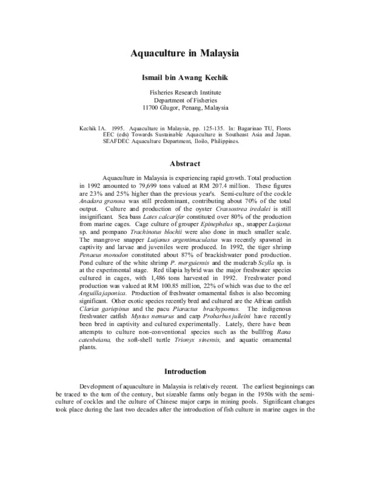Perlihatkan publikasi sederhana
Screening of inexpensive and indigeneous ingredients for use in practical feed for juvile sea bass (Lates calcarifer Bloch)
| dc.contributor.author | Coloso, Relicardo M. | |
| dc.contributor.author | Hipolito, Jose Roy | |
| dc.contributor.author | Murillo, Deograce | |
| dc.date.accessioned | 2011-07-18T14:19:05Z | |
| dc.date.available | 2011-07-18T14:19:05Z | |
| dc.date.issued | 1996 | |
| dc.identifier.uri | http://hdl.handle.net/10862/551 | |
| dc.description | Abstract only | en |
| dc.description.abstract | An eight-week feeding experiment with juvenile sea bass (about 15 g) was conducted in 500-1 fiberglass tanks to screen the most cost-effective practical diet for use in ponds and floating cages. Eleven formulations and one control feed were tested. Protein sources used were locally available ingredients such as fish meal, shrimp head meal, scrap squid meal, cow's blood meal, poultry feather meal, leaf meals, soybean meal, and mung bean meal. The diets contained a combination of animal and vegetable protein sources such that the essential amino acid composition was close to the requirement or tissue levels. Crude protein and fat levels were about 42% and 8.3%, respectively. Fish were fed ad libitum twice a day at 0800 and 1600 h. Best weight gain (189%) and feed conversion ratio (FCR, 1.7) were observed in fish given a combination of fish meal, shrimp head meal, scrap squid meal, soybean bean meal, and kangkong leaf meal as protein sources. This was followed by those given a combination of fish meal, shrimp head meal, scrap squid meal, soybean meal, and ipil-ipil leaf meal (139% weight gain, FCR of 2.2). Worst growth (22%) and FCR were observed in fish given a combination of fish meal, cow's blood meal, scrap squid meal, soybean meal, and mulberry leaf meal. Control fish given a combination of fish meal, shrimp meal, and soybean meal showed weight gain of 195% and FCR of 1.8. Survival was high (83-100%) in all treatments. The two diets which gave the best growth rates, survival, and FCR in the screening phase can be tried in ponds and floating net cages. | en |
| dc.publisher | Aquaculture Department, Southeast Asian Fisheries Development Center | en |
| dc.subject | Lates calcarifer | en |
| dc.title | Screening of inexpensive and indigeneous ingredients for use in practical feed for juvile sea bass (Lates calcarifer Bloch) | en |
| dc.type | Conference paper | en |
| dc.subject.asfa | artificial feeding | en |
| dc.subject.asfa | cage culture | en |
| dc.subject.asfa | diet | en |
| dc.subject.asfa | fish culture | en |
| dc.subject.asfa | pond culture | en |
| dc.subject.asfa | proteins | en |
| dc.subject.asfa | rearing techniques | en |
| dc.subject.scientificName | Lates calcarifer | en |
Files in this item
Publikasi ini ada di koleksi berikut
-
Feeds for Small-scale Aquaculture [23]
Proceedings of the National Seminar-Workshop on Fish Nutrition and Feeds, Tigbauan, Iloilo, Philippines, 1 -2 June 1994





